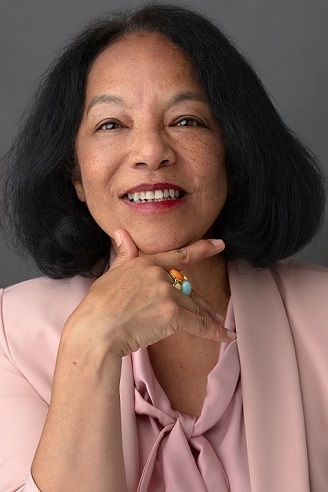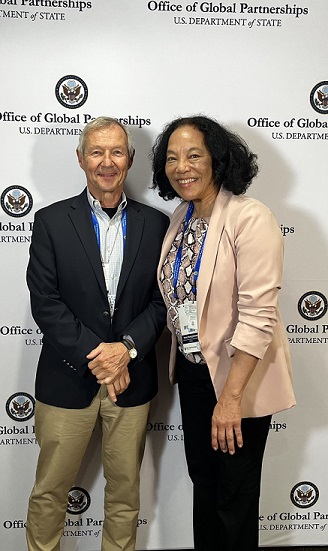Students Conduct Research for the State Department Through Diplomacy Lab
| by Caitlin Fillmore
Nancy Kwang Johnson MAIPD ’24 shared conflict transformation research and presented findings at the Diplomacy Lab Fair.

What happens when a nation must grapple with its evolving identity, including its national language?
Nancy Kwang Johnson MAIPD ’24 traveled to Montenegro in October 2023 to find out directly from leaders on the ground, as part of her role as a student researcher with the State Department’s Diplomacy Lab.
Diplomacy Lab employs students from select universities and graduate schools, outsourcing projects on key global diplomacy issues the State Department needs to understand but lacks the bandwidth to take on itself.
“The ability to problem solve and serve as a consultant for the State Department was a huge honor,” Johnson said. “Being the first project accepted from the Middlebury Institute was the cherry on top.”
This was the first year the Institute participated in Diplomacy Lab, and Johnson hopes many students will follow her.

Johnson used Diplomacy Lab as her client-based practicum project for her MA in International Policy and Development. She drew on her experience in creating a master’s program in international affairs for emergent leaders in Albania and as a former professor of political science.
Johnson’s goal was to understand and report back on the cultural challenges of Montenegro, a republic of the former Yugoslavia that narrowly gained independence from Serbia in 2006 and joined NATO in 2017. The State Department describes this region as experiencing “transitional justice.”
The project leads told her she could do the work remotely, but Johnson knew she wanted to be on the ground.
“I knew how the news cycle worked in that part of the world, and I wanted an opportunity to work side-by-side,” said Johnson who received experiential learning funding from the Institute to make that happen.
The ability to problem solve and serve as a consultant for the State Department was a huge honor. Being the first project accepted from MIIS was the cherry on top.
Serbia and Montenegro were a single federation from 1992 until 2006, and Serbs make up about a third of Montenegro’s population. There is still tension between Montenegrins and Serbians on the legitimacy of Montenegro and its language. Johnson worked for a month, talking to local organizations and analyzing recent census data to explore what it means for the region to embrace an identity deeply rooted and intertwined with one’s ethnicity, language, culture, and religion.
“I wanted to learn how Montenegrins grew into their identity,” Johnson said. “What it means to be Montenegrin in Montenegro and Serbian in Montenegro.”
Official census numbers seem to inflate the number of Serbian speakers in Montenegro, exaggerating the influence of Serbian culture, Johnson said. Language is deeply tied to identities informed by generations of ethnic conflict between the nations. Understanding how language is used in the divided nation reveals prospects of recognizing and resolving deep scars, like the Srebrenica genocide in July 1995, Johnson said.
“The census alludes to how politicians want to inform politics and how the Serbian minority in Montenegro would want to inflate the number of Serbian speakers vs. Montenegrin speakers,” Johnson said.
Montenegro, a Balkan nation bordering the Adriatic Sea with a population of 600,000, rests in a diplomatic tension zone. Serbia aligns with Russia—further complicating international relations.
“How do you democratize Montenegro based on the politics of Serbia?” Johnson asked. “It matters how democratized Montenegro is and how Montenegro regulates corruption and how that might affect their EU application.”
Johnson worked closely with the political-economic chief at the U.S. Embassy in Podgorica, Montenegro to gain access to local NGOs.
Johnson became the first-ever Middlebury Institute student to have a proposal accepted by the State Department in May 2023. She was invited to present the findings to the State Department at the Diplomacy Lab fair in Washington, D.C. in April 2024.
“I presented my project in a room full of diplomats, regional experts, and problem solvers who focus on matters of state and foreign affairs every day,” Johnson said. “It’s really inspiring to be able to pitch the project and share my findings and get incredible feedback.”
Johnson called her Diplomacy Lab experience “life altering.”
“Being in that room and problem solving for a day made me realize I wouldn’t have been able to get to that point if I hadn’t applied to the Middlebury Institute and if I hadn’t chosen the program that I did.”
| by Caitlin Fillmore
Nancy Kwang Johnson MAIPD ’24 shared conflict transformation research and presented findings at the Diplomacy Lab Fair.
| by Jason Warburg
Eighteen students have completed paid internships with UNICEF over the past two years through a Memorandum of Understanding that kicked off in 2019.
| by Jason Warburg
The U.S. Department of State has awarded one current Middlebury Institute student and two recent graduates Critical Language Scholarships for the study of languages considered vital to national security and economic prosperity.